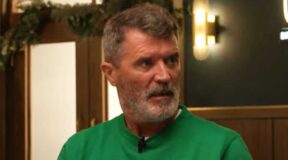CHRIS KIRKLAND has opened up about his battle with addiction in a powerful interview.
The former Liverpool and England goalkeeper developed an addiction to painkillers as he managed a back injury during his playing career.
Kirkland, 41, first sustained a back issue during Liverpool training, with the problem continuing to rear its head after he joined Wigan in 2006.
His addiction nearly resulted in tragedy, when he found himself standing on the roof of an eight-storey apartment block while on apre-season trip with Bury in 2016.
After considering taking his own life Kirkland felt the presence of wife Leeona and daughter Lucy and stepped down – flying home the next day to seek help.
Following three stints in rehab Kirkland is now getting his story out there to aid his recovery – and potentially help others suffering in a similar situation.
Read More Football Stories
Neymar offered to Man City, Lewandowski’s first day at Barca, Tielemans news
Dele Alli in one of worst misses you’ll EVER see with open goal from 3 YARDS
Speaking to The Times, he said: "My story is going to shock a lot of people. I shouldn’t be here. Because of the amount I was taking.
"It’s Tramadol so you’re not meant to take any more than 400 milligrams a day, maximum.
"I was taking 1,000 milligrams of Tramadol a day every day. I was taking 2,500 milligrams a day at Sheffield Wednesday.
"I’d get 100 pills over the internet from India, they were about £300. I’d get through those in a week, easy.
"I’d go to the bottom of [my] drive and meet the postman and then whack the parcel in my car before Leeona even knew about it.
"They told me when I went to rehab the only reason I am alive is my fitness."
Most read in Football
DWIGHT'S GRIEF Former Man United Striker Dwight Yorke mourns after older brother found dead
David and Victoria Beckham bump into Sarah Ferguson during holiday to Italy
Halifax's Jamie Allen quits pre-season for Love Island DAYS after signing new deal
Brentford in talks with Mee over free transfer with defender looking for new club
Kirkland began getting bad back spasms in the 2009-10 season with Wigan, receiving painkillers to take from the Latics.
After falling behind Ali Al-Habsi in the pecking order he moved to Sheffield Wednesday in 2012, but struggled to cope with the change.
Kirkland found himself having to get up at 5:30am to head to training, missing his daughter's plays and stressing about a contract clause that could have seen him released for missing three consecutive games.
To make sure he would meet his contract criteria he believed he should take more painkillers, explaining: "I thought I’ll never get addicted.
"I’m strong enough to only take them when I need them but it got a grip of me, my body needed it more and more and I became dependent on them.
I was sneaky. That’s what addiction is. Anything to get my hit
"The first season was manageable. The second season I was on them a lot every day, more or less. Leeona didn’t know.
"I kept them in the car, hidden, took them on the way to training.
"I was sneaky. That’s what addiction is. Anything to get my hit."
A move to Preston followed in 2015 but by this point his mental health had deteriorated to the point where his heart wasn't in football anymore.
Kirkland's move to Bury came a year later, as did his scary brush with death on the roof of an apartment block.
Contact the Samaritans
If you have been affected by any of the issues raised in this article, contact The Samaritans on 116 123.
They are available for free at anytime.
Or email https://www.samaritans.org/
He recalled: "I was in the worse mental state ever, all over the place but the professional thing kicks in, ‘right you can get through this’. Bury didn’t know.
"I took loads of painkillers when I was out on pre-season with Bury.
"We were in an apartment block, I was actually on the top floor and literally went out the door on to a roof.
"The first night, I wasn’t standing on the edge, but I was in a bad way, crying my eyes out, thinking I have to do this.
"The second night, I was standing there and was going to jump but then I felt that pull back.
"I rang Leeona, and said, ‘I need help, I am addicted to painkillers’. ‘You need to come home,’ she said."
After contacting the PFA Kirkland received help and was okay for 18 months, before relapsing on Tramadol in 2018.
A stint in rehab followed as the country entered lockdown in 2020, with Kirkland dragged back into a dark place.
I didn’t know who I was. It was the most horrendous experience I’ve ever had in my life
Things reached a new low earlier this year, as he explained: "I got some off the internet and they came from India and you don’t know what’s in them.
"Within ten minutes of taking two, I didn’t know who I was. It was the most horrendous experience I’ve ever had in my life.
"I was violently ill, went to bed and next morning I went out to the car and tipped them all down the drain.
"I thought ‘you’ve got to get off these or you’re going to kill yourself’."
In February Kirkland underwent another detox before returning to Parkland Place for more rehab, and is now five months clean.
He hopes that others can be prevented from the agony that he has gone through, but has fears over the PFA's resources.
Kirkland added: "When this story comes out hopefully football clubs will take notice and the PFA put things in place.
"Listen, this is the tough bit. The PFA get battered for certain things and there are things they should do a lot better.
Read More on The Sun
Man splits opinion after refusing to swap plane seats with 8-year-old girl
Primary school teachers reveal the end of term gifts they hate
"There is not enough staff for the level of support needed for [4,000] current players and 50,000 ex-players."
On how he feels now, he concluded: "I’ve stopped lying and deceiving. It’s a massive weight off my shoulders. I feel my life is starting again."
If you are affected by any of the issues raised in this article, please call the Samaritans for free on 116123.
Source: Read Full Article















